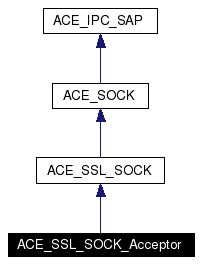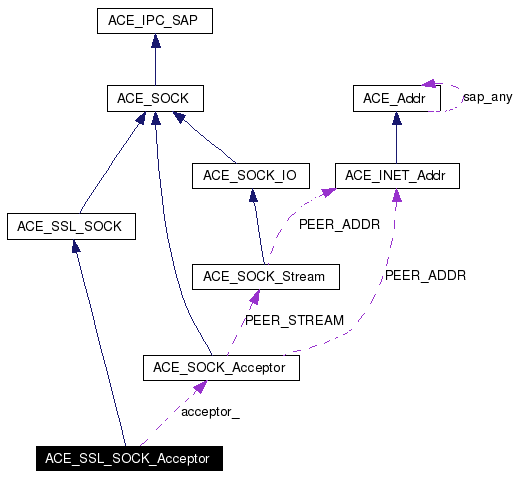
ACE_SSL_SOCK_Stream objects passively.
More...
#include <SSL_SOCK_Acceptor.h>
Inheritance diagram for ACE_SSL_SOCK_Acceptor:


Public Types | |
| typedef ACE_INET_Addr | PEER_ADDR |
| typedef ACE_SSL_SOCK_Stream | PEER_STREAM |
Public Member Functions | |
| ACE_SSL_SOCK_Acceptor (void) | |
| Default constructor. | |
| ~ACE_SSL_SOCK_Acceptor (void) | |
| Default destructor. | |
| ACE_SSL_SOCK_Acceptor (const ACE_Addr &local_sap, int reuse_addr=0, int protocol_family=PF_UNSPEC, int backlog=ACE_DEFAULT_BACKLOG, int protocol=0) | |
| ACE_SSL_SOCK_Acceptor (const ACE_Addr &local_sap, ACE_Protocol_Info *protocolinfo, ACE_SOCK_GROUP g, u_long flags, int reuse_addr, int protocol_family=PF_UNSPEC, int backlog=ACE_DEFAULT_BACKLOG, int protocol=0) | |
| int | open (const ACE_Addr &local_sap, int reuse_addr=0, int protocol_family=PF_UNSPEC, int backlog=ACE_DEFAULT_BACKLOG, int protocol=0) |
| int | close (void) |
| Close the listening socket. | |
Passive Connection "accept" Methods | |
These are the canonical methods exposed by the Acceptor pattern. | |
| int | accept (ACE_SSL_SOCK_Stream &new_stream, ACE_Addr *remote_addr=0, ACE_Time_Value *timeout=0, int restart=1, int reset_new_handle=0) const |
| int | accept (ACE_SSL_SOCK_Stream &new_stream, ACE_Accept_QoS_Params qos_params, ACE_Addr *remote_addr=0, ACE_Time_Value *timeout=0, int restart=1, int reset_new_handle=0) const |
Public Attributes | |
| ACE_ALLOC_HOOK_DECLARE | |
| Declare the dynamic allocation hooks. | |
Protected Member Functions | |
| int | ssl_accept (ACE_SSL_SOCK_Stream &new_stream, ACE_Time_Value *timeout) const |
| Complete SSL passive connection establishment. | |
Private Attributes | |
| ACE_SOCK_Acceptor | acceptor_ |
| The BSD-socket workhorse. | |
ACE_SSL_SOCK_Stream objects passively.
The ACE_SSL_SOCK_Acceptor has its own ACE_SOCK_Acceptor which handles the basic socket acceptance. This class is a wrapper which adds the SSL acceptance handshake handling. Since SSL is record oriented, some additional steps must be taken after the basic socket acceptance to complete the SSL handshake that takes place at session establishment.
Definition at line 52 of file SSL_SOCK_Acceptor.h.
|
|
Definition at line 170 of file SSL_SOCK_Acceptor.h. |
|
|
Definition at line 171 of file SSL_SOCK_Acceptor.h. |
|
|
Default constructor.
Definition at line 8 of file SSL_SOCK_Acceptor.inl. References ACE_TRACE.
|
|
|
Default destructor.
|
|
||||||||||||||||||||||||
|
Initiate a passive mode SSL/BSD-style acceptor socket.
Definition at line 15 of file SSL_SOCK_Acceptor.inl. References ACE_TRACE, and ACE_SSL_SOCK::set_handle().
00020 : acceptor_ (local_sap, 00021 reuse_addr, 00022 protocol_family, 00023 backlog, 00024 protocol) 00025 { 00026 ACE_TRACE ("ACE_SSL_SOCK_Acceptor::ACE_SSL_SOCK_Acceptor"); 00027 00028 this->set_handle (this->acceptor_.get_handle ()); 00029 } |
|
||||||||||||||||||||||||||||||||||||
|
Initiate a passive-mode QoS-enabled acceptor socket.
Definition at line 32 of file SSL_SOCK_Acceptor.inl. References ACE_TRACE, and ACE_SSL_SOCK::set_handle().
00040 : acceptor_ (local_sap, 00041 protocolinfo, 00042 g, 00043 flags, 00044 reuse_addr, 00045 protocol_family, 00046 backlog, 00047 protocol) 00048 { 00049 ACE_TRACE ("ACE_SSL_SOCK_Acceptor::ACE_SSL_SOCK_Acceptor"); 00050 00051 this->set_handle (this->acceptor_.get_handle ()); 00052 } |
|
||||||||||||||||||||||||||||
|
Accept a new ACE_SSL_SOCK_Stream connection using the RVSP QoS information in qos_params.
Definition at line 212 of file SSL_SOCK_Acceptor.cpp. References ACE_SOCK_Acceptor::accept(), ACE_TRACE, ACE_SSL_SOCK_Stream::close(), ACE_IPC_SAP::get_handle(), ACE_IPC_SAP::set_handle(), ACE_SSL_SOCK_Stream::set_handle(), ssl_accept(), and ACE_Countdown_Time::update().
00218 {
00219 ACE_TRACE ("ACE_SSL_SOCK_Acceptor::accept");
00220
00221 // Take into account the time to complete the basic TCP handshake
00222 // and the SSL handshake.
00223 ACE_Countdown_Time countdown (timeout);
00224
00225 ACE_SOCK_Stream temp_stream;
00226 if (-1 == this->acceptor_.accept (temp_stream,
00227 qos_params,
00228 remote_addr,
00229 timeout,
00230 restart,
00231 reset_new_handle))
00232 return -1;
00233
00234 (void) countdown.update ();
00235
00236 new_stream.set_handle (temp_stream.get_handle ());
00237 temp_stream.set_handle (ACE_INVALID_HANDLE);
00238
00239 if (this->ssl_accept (new_stream, timeout) == -1)
00240 {
00241 new_stream.close ();
00242 new_stream.set_handle (ACE_INVALID_HANDLE);
00243 return -1;
00244 }
00245
00246 return 0;
00247 }
|
|
||||||||||||||||||||||||
|
Accept a new ACE_SSL_SOCK_Stream connection. On successful return, the socket has been accepted and the SSL handshake has been completed.
Definition at line 175 of file SSL_SOCK_Acceptor.cpp. References ACE_SOCK_Acceptor::accept(), ACE_TRACE, ACE_SSL_SOCK_Stream::close(), ACE_IPC_SAP::get_handle(), ACE_IPC_SAP::set_handle(), ACE_SSL_SOCK_Stream::set_handle(), ssl_accept(), and ACE_Countdown_Time::update().
00180 {
00181 ACE_TRACE ("ACE_SSL_SOCK_Acceptor::accept");
00182
00183 // Take into account the time to complete the basic TCP handshake
00184 // and the SSL handshake.
00185 ACE_Countdown_Time countdown (timeout);
00186
00187 ACE_SOCK_Stream temp_stream;
00188 if (-1 == this->acceptor_.accept (temp_stream,
00189 remote_addr,
00190 timeout,
00191 restart,
00192 reset_new_handle))
00193 return -1;
00194
00195 (void) countdown.update ();
00196
00197 new_stream.set_handle (temp_stream.get_handle ());
00198 temp_stream.set_handle (ACE_INVALID_HANDLE);
00199
00200 if (this->ssl_accept (new_stream, timeout) == -1)
00201 {
00202 new_stream.close ();
00203 new_stream.set_handle (ACE_INVALID_HANDLE);
00204 return -1;
00205 }
00206
00207 return 0;
00208
00209 }
|
|
|
Close the listening socket.
Reimplemented from ACE_SOCK. Definition at line 75 of file SSL_SOCK_Acceptor.inl. References ACE_TRACE, ACE_SOCK_Acceptor::close(), and ACE_SSL_SOCK::set_handle().
00076 {
00077 ACE_TRACE ("ACE_SSL_SOCK_Acceptor::close ()");
00078
00079 int result = this->acceptor_.close ();
00080 this->set_handle (ACE_INVALID_HANDLE);
00081
00082 return result;
00083 }
|
|
||||||||||||||||||||||||
|
Initiate a passive mode SSL/BSD-style acceptor socket.
Definition at line 55 of file SSL_SOCK_Acceptor.inl. References ACE_TRACE, ACE_SOCK_Acceptor::open(), and ACE_SSL_SOCK::set_handle().
00060 {
00061 ACE_TRACE ("ACE_SSL_SOCK_Acceptor::open");
00062 if (this->acceptor_.open (local_sap,
00063 reuse_addr,
00064 protocol_family,
00065 backlog,
00066 protocol) != 0)
00067 return -1;
00068 else
00069 this->set_handle (this->acceptor_.get_handle ());
00070
00071 return 0;
00072 }
|
|
||||||||||||
|
Complete SSL passive connection establishment.
Definition at line 34 of file SSL_SOCK_Acceptor.cpp. References ACE_ASSERT, ACE_BIT_DISABLED, ACE_NONBLOCK, ACE::clr_flags(), EWOULDBLOCK, ACE_SSL_SOCK::get_handle(), ACE_Handle_Set::num_set(), ACE_SSL_Context::report_error(), ACE::select(), ACE_Handle_Set::set_bit(), ACE_OS::set_errno_to_last_error(), ACE::set_flags(), ACE_SSL_SOCK_Stream::ssl(), and ACE_Countdown_Time::update(). Referenced by accept().
00036 {
00037 SSL *ssl = new_stream.ssl ();
00038
00039 if (SSL_is_init_finished (ssl))
00040 return 0;
00041
00042 if (!SSL_in_accept_init (ssl))
00043 ::SSL_set_accept_state (ssl);
00044
00045 ACE_HANDLE handle = new_stream.get_handle ();
00046
00047 // We're going to call SSL_accept, optionally doing ACE::select and
00048 // retrying the SSL_accept, until the SSL handshake is done or
00049 // it fails.
00050 // To get the timeout affect, set the socket to nonblocking mode
00051 // before beginning if there is a timeout specified. If the timeout
00052 // is 0 (wait as long as it takes) then don't worry about the blocking
00053 // status; we'll block in SSL_accept if the socket is blocking, and
00054 // block in ACE::select if not.
00055 int reset_blocking_mode = 0;
00056 if (timeout != 0)
00057 {
00058 reset_blocking_mode = ACE_BIT_DISABLED (ACE::get_flags (handle),
00059 ACE_NONBLOCK);
00060 // Set the handle into non-blocking mode if it's not already
00061 // in it.
00062 if (reset_blocking_mode
00063 && ACE::set_flags (handle,
00064 ACE_NONBLOCK) == -1)
00065 return -1;
00066 }
00067
00068 // Take into account the time between each select() call below.
00069 ACE_Countdown_Time countdown (timeout);
00070
00071 int status;
00072 do
00073 {
00074 // These handle sets are used to set up for whatever SSL_accept
00075 // says it wants next. They're reset on each pass around the loop.
00076 ACE_Handle_Set rd_handle;
00077 ACE_Handle_Set wr_handle;
00078
00079 status = ::SSL_accept (ssl);
00080 switch (::SSL_get_error (ssl, status))
00081 {
00082 case SSL_ERROR_NONE:
00083 status = 0; // To tell caller about success
00084 break; // Done
00085
00086 case SSL_ERROR_WANT_WRITE:
00087 wr_handle.set_bit (handle);
00088 status = 1; // Wait for more activity
00089 break;
00090
00091 case SSL_ERROR_WANT_READ:
00092 rd_handle.set_bit (handle);
00093 status = 1; // Wait for more activity
00094 break;
00095
00096 case SSL_ERROR_ZERO_RETURN:
00097 // The peer has notified us that it is shutting down via
00098 // the SSL "close_notify" message so we need to
00099 // shutdown, too.
00100 status = -1;
00101 break;
00102
00103 case SSL_ERROR_SYSCALL:
00104 // On some platforms (e.g. MS Windows) OpenSSL does not
00105 // store the last error in errno so explicitly do so.
00106 //
00107 // Explicitly check for EWOULDBLOCK since it doesn't get
00108 // converted to an SSL_ERROR_WANT_{READ,WRITE} on some
00109 // platforms. If SSL_accept failed outright, though, don't
00110 // bother checking more. This can happen if the socket gets
00111 // closed during the handshake.
00112 if (ACE_OS::set_errno_to_last_error () == EWOULDBLOCK &&
00113 status == -1)
00114 {
00115 // Although the SSL_ERROR_WANT_READ/WRITE isn't getting
00116 // set correctly, the read/write state should be valid.
00117 // Use that to decide what to do.
00118 status = 1; // Wait for more activity
00119 if (SSL_want_write (ssl))
00120 wr_handle.set_bit (handle);
00121 else if (SSL_want_read (ssl))
00122 rd_handle.set_bit (handle);
00123 else
00124 status = -1; // Doesn't want anything - bail out
00125 }
00126 else
00127 status = -1;
00128 break;
00129
00130 default:
00131 ACE_SSL_Context::report_error ();
00132 status = -1;
00133 break;
00134 }
00135
00136 if (status == 1)
00137 {
00138 // Must have at least one handle to wait for at this point.
00139 ACE_ASSERT (rd_handle.num_set() == 1 || wr_handle.num_set () == 1);
00140 status = ACE::select (int (handle) + 1,
00141 &rd_handle,
00142 &wr_handle,
00143 0,
00144 timeout);
00145
00146 (void) countdown.update ();
00147
00148 // 0 is timeout, so we're done.
00149 // -1 is error, so we're done.
00150 // Could be both handles set (same handle in both masks) so
00151 // set to 1.
00152 if (status >= 1)
00153 status = 1;
00154 else // Timeout or failure
00155 status = -1;
00156 }
00157
00158 } while (status == 1 && !SSL_is_init_finished (ssl));
00159
00160 if (reset_blocking_mode)
00161 {
00162 ACE_Errno_Guard eguard (errno);
00163 ACE::clr_flags (handle, ACE_NONBLOCK);
00164 }
00165
00166 return (status == -1 ? -1 : 0);
00167
00168 }
|
|
|
The BSD-socket workhorse.
Definition at line 186 of file SSL_SOCK_Acceptor.h. |
|
|
Declare the dynamic allocation hooks.
Reimplemented from ACE_SOCK. Definition at line 175 of file SSL_SOCK_Acceptor.h. |
 1.3.6
1.3.6